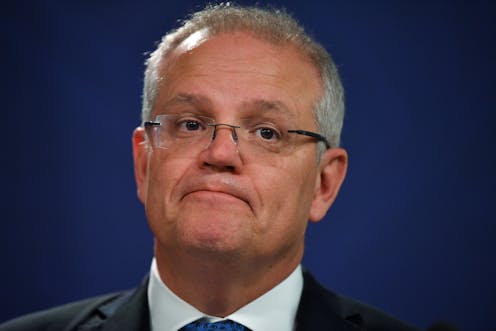View from The Hill: Scott Morrison returns, with regret
- Written by Michelle Grattan, Professorial Fellow, University of Canberra

We don’t often hear an apology from Scott Morrison – indeed, it is hard to think of an earlier occasion – but he finally swallowed his stubbornness and issued a sort of one early Friday.
“I deeply regret any offence caused to any of the many Australians affected by the terrible bushfires by my taking leave with family at this time,” he said in a statement. It came after the deaths of two fire fighters and the injury of others, and Morrison’s decision to cut short his Hawaiian holiday.
But the prime minister still remained quite focused on why he’d taken leave just now, telling 2GB how he’d had to bring his holiday forward because of his commitments to visit India and Japan in January, missing a break at the coast. So he’d wanted to give his girls a surprise with this family trip to Hawaii. Etc. Etc.
He didn’t seem to grasp that while he likes to emphasise his relationship with the ordinary Australian, as prime minister he is not an ordinary Australian.
There’s been a lot of talk about how people don’t, or shouldn’t, begrudge Morrison a holiday. But, with the exception of family illness, a prime minister’s priorities should be the needs of his position ahead of personal matters, especially holidays. It sounds harsh, but that’s the nature of the job. And many firefighters are sacrificing holidays (and much more) this summer.
A national leader has, at the very least, a duty to provide the support of his or her presence at such times, including, indeed, as a gesture to state colleagues who are shouldering so much of the administrative burden.
Also, Morrison missed the point that it was inappropriate for a prime minister to disappear from sight – literally - without a public explanation or an adequate reason (such as a visit to Australian troops abroad, when news organisations rightfully respect a blackout).
This applies any time, but especially when the country is burning. All week his office would not say where he was. While there had been talk of both privacy and security concerns for this extraordinary refusal, Morrison admitted on 2GB “it’s more about privacy at the end of the day”.
Even if he’d made an initial misjudgement and flown off on his holiday, Morrison should have quickly realised his mistake, left Jenny and the kids at their destination, and got on a plane back home.
It was a classic case of a tin ear, which was rather surprising from a man who has proved pretty astute at reading the electoral mood. “This had been arranged some time ago and that’s just how it was,” he said lamely on Friday.
“[Australians] know that … I don’t hold a hose … and I don’t sit in a control room. …
"But I know that Australians would want me back at this time out of these fatalities. So I’ll happily come back.”
The public make judgements about a PM’s leadership qualities from their behaviour during crises.
Gough Whitlam was criticised when he only briefly broke a long and indulgent (official) overseas trip to return to see the devastation Cyclone Tracy had wrought on Darwin.
In a 2016 article, “I Had to Come to See for Myself: Prime Ministers, Natural Disasters and the People”, academic Rosemary Williamson presented a historical rundown of prime ministerial responses to disasters.
She noted “growing emphasis in parliament and press on the prime minister ‘being there’ for Australians – physically and emotionally – when disaster strikes”.
“Disaster can quickly shift attention to the qualities of the prime minister at a time when Australians are most vulnerable,” she wrote.
Presciently, she added, “Experts tell us to expect more, and more intense, sudden natural disasters. Australians will have expectations of prime ministerial leadership at these times. Apart from promises of federal aid and co-operation with state governments, Australians no doubt will expect prime ministers to come and see for themselves , to demonstrate empathy and to instill confidence in recovery.”
The trouble for Morrison after he returns on Saturday is that having been absent, whatever he does to reinforce his presence will likely trigger some cynicism. One report predicted he would “hit the ground running”. Doing too much would invite comparisons with when he wasn’t doing anything (except receiving briefings at a distance).
The most extraordinary part of this saga is how Morrison and his office thought they could keep the holiday story, and in particular the destination, under wraps.
When the PM leaves the country, there is an acting prime minister, and that is a matter of public record. And as Morrison is normally out and about all the time, it was beyond belief he could be quietly absent for days without questions being asked and those questions mounting as the fires became worse.
Finally, there was the danger of the almost certain random spotting. Once Morrison was reportedly seen boarding an aircraft for Hawaii, the genie was out.
Some journalists are adamant the media office told direct lies, a point contested by the PMO. Regardless, this affair reflects badly on the media team, as it does on the prime minister.
Journalists will be surprised at the naivety involved, but not so much at the attempted media manipulation by the PMO.
All prime ministers try to manage the media but Morrison is an extreme example. He is shameless about his use of favourites, whether individuals or outlets. The government regards The Australian as its bulletin board for announcements.
When it comes to dealing with the media, the prime minister’s office tries to exert maximum control, through a combination of privileged treatment and occasional threats.
This background perhaps partly explains Morrison’s delusion that his holiday frolic could be kept in house.
Authors: Michelle Grattan, Professorial Fellow, University of Canberra
Read more http://theconversation.com/view-from-the-hill-scott-morrison-returns-with-regret-129189





